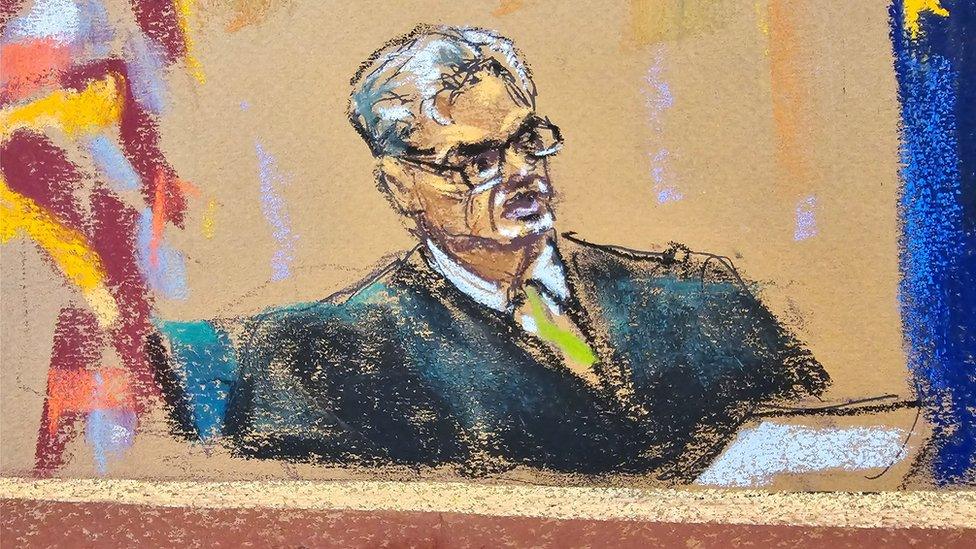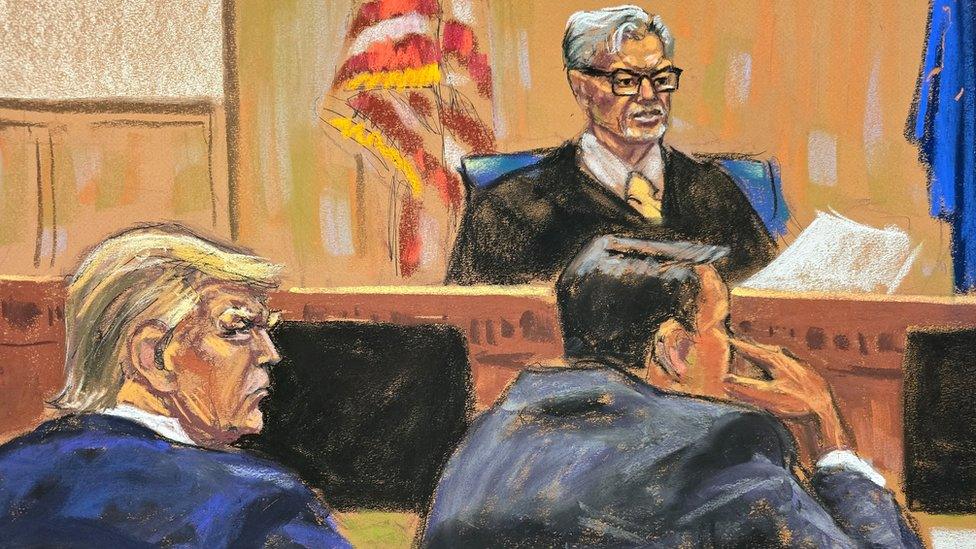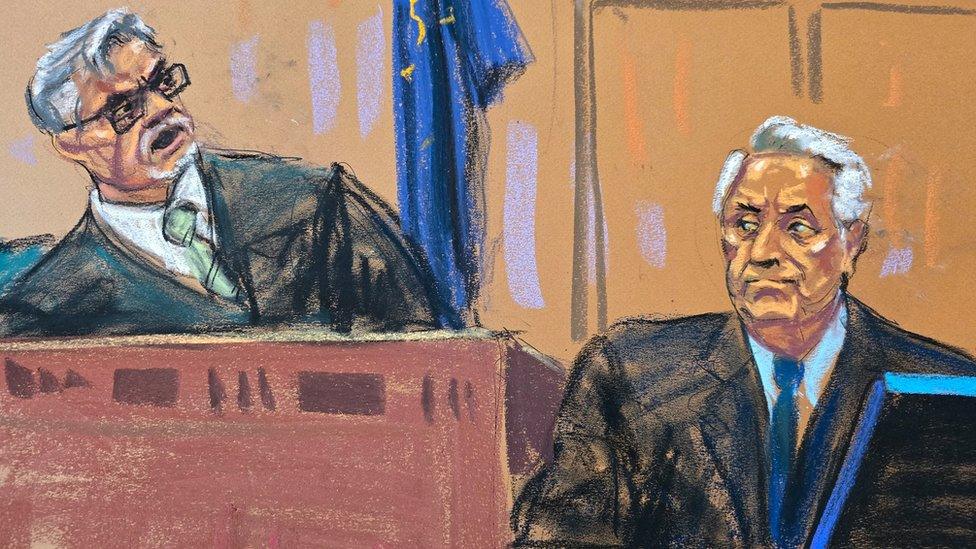Who is Juan Merchan, the 'no-nonsense' judge who oversaw Trump's hush-money case?
- Published

Justice Juan Manuel Merchan has sat on the New York County Supreme Court since 2009
Donald Trump has described the judge who oversaw his hush-money trial - where he was found guilty on all 34 felony counts of falsifying business records - as a "certified Trump hater".
Others say New York County Supreme Court Justice Juan Manuel Merchan is a tough and no-nonsense but fair jurist.
Before this case, the most high-profile to ever cross his courtroom, Justice Merchan served 17 years on the bench.
He is also no stranger to the drama Trump brings to the justice system.
Legally speaking, the jurist and newly-convicted felon have crossed paths before.
In 2022, Justice Merchan presided over the tax-fraud trial that led to the conviction of the Trump Organization's chief financial officer, Allen Weisselberg.
He is also the judge for the fraud and money-laundering case against Steve Bannon, a staunch Trump ally. That trial begins in September.
Before, during and since the trial ended, Trump has relentlessly slammed Justice Merchan, both in public remarks and on social media.
He has accused the judge of bias, conflict of interest and repeated rulings against the defence - comments that mirror what he has said about officials involved in his other trials.
Who is Judge Juan Merchan?
Justice Merchan began his legal career in 1994, when he graduated from Hofstra University School of Law.
He worked as a prosecutor, first in the New York County District Attorney's Office, then as an assistant attorney general in both Nassau and Suffolk counties.
He was appointed a family court judge in 2006. But since 2009, he has presided over criminal matters at the New York County Supreme Court.
"He's a serious jurist, smart and even-tempered," Manhattan defence attorney Ron Kuby told NBC News., external
"He's not one of those judges who yells at lawyers, and is characterised as a no-nonsense judge. But he's always in control of the courtroom."
In the case against the Trump Organization, Justice Merchan was adamant that the charges were absolutely not politically motivated.
The organisation's lawyer had argued Weisselberg was being targeted because of his association with the former president.
"I will not allow you in any way to bring up a selective prosecution claim, or claim this is some sort of novel prosecution," Justice Merchan said, according to the BBC's news partner CBS., external

Justice Merchan instructs the jury as Trump looks on
A soft-spoken but stern jurist
Justice Merchan is known for his reserved nature. He is not a loud man, which can make it a bit difficult to hear him when he makes an important decision in court, but he is no pushover, either.
Throughout the trial, he pushed back against Trump's defence team when it tried to challenge their client's gag order or attempted to expand the parameters of his directions and instructions.
The gag order prohibited the former president from speaking about the witnesses, jurors and others involved in the case - and the judge fined Trump $1,000 each for 10 alleged violations of the order.
But he added that he knew the fines had a limited effect because of Trump's wealth. He warned at the time that, as "a last resort", he would consider jailing the defendant for further infractions.
"Mr Trump, it's important to understand that the last thing I want to do is to put you in jail," he said in court. "You are the former president of the United States and possibly the next president, as well."
That threat appeared to mollify Trump in the interim, but it was not the only time the judge would address bad behaviour during the trial.
He cleared the courtroom to scold the case's final witness - Robert Costello - who the defence had called to rebut claims made by Michael Cohen, Trump's former lawyer and the prosecution's star witness.
Mr Costello, an outspoken critic of the case, expressed frustration on the stand and audibly said "jeez" when the judge sustained multiple objections from prosecutors that cut off his responses.
After sending out those seated in the benches, he chastised the former federal prosecutor about "proper decorum in my courtroom".
"You don't say 'jeez'. And then if you don't like my ruling, you don't give me side eye, and you don't roll your eyes," he told the witness.

Justice Merchan scolds Robert Costello
The $15 Joe Biden donation
Soon after Trump was arraigned, records emerged showing Justice Merchan had donated a total of $35 to Democrats during the 2020 election.
That included a $15 donation to Joe Biden's campaign, NBC News reported, as well as $10 donations to groups called the "Progressive Turnout Project" and "Stop Republicans".
New York state, following the American Bar Association's guidance, prohibits judges from making contributions to political organisations or candidates.
Even though the donations were ill-advised, they would be "viewed as trivial, especially given the small sums", Stephen Gillers, an expert on legal ethics at New York University, told the BBC.
Justice Merchan did not recuse himself over the donations.
WATCH: Trump calls trial 'a disgrace' after guilty verdict
Daughter has worked for Democrats
The judge's daughter, Loren Merchan, was at the centre of a bigger conflict-of-interest storm.
Ms Merchan is president of Authentic Campaigns, a firm that has worked on digital fundraising and advertising for Democratic clients, including Mr Biden and Adam Schiff, a top Trump critic on Capitol Hill who led efforts to impeach him.
This again prompted Trump to push for the judge's removal from the case, and Justice Merchan consulted with the New York State Advisory Committee on Judicial Ethics over the matter.
But the panel determined "the matter currently before the judge does not involve either the judge's relative or the relative's business, whether directly or indirectly".
With that established, the judge declined to recuse himself from the case.
Trump also blasted Ms Merchan on social media, leading prosecutors to request an expansion of the former president's gag order to include the judge's family. Justice Merchan approved that request.
Comments about Ms Merchan could cause the judge to worry about the safety of his "loved ones", he wrote, which would "undoubtedly interfere with the fair administration of justice".
Under the expanded order, Trump was barred from speaking about witnesses, jurors, court staff, lawyers for the prosecution, and their families.
But he was not precluded from speaking about the judge or Manhattan District Attorney Alvin Mr Bragg, the lead prosecutor.
Trump decried the gag order as violating his constitutional right to free speech.
- Published31 May 2024
- Published30 May 2024
- Published30 May 2024